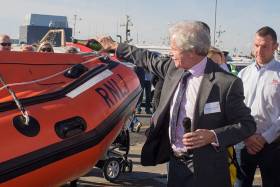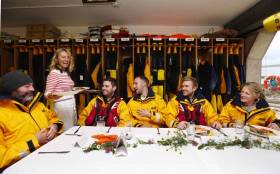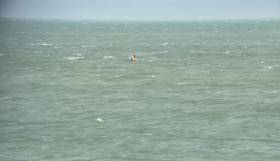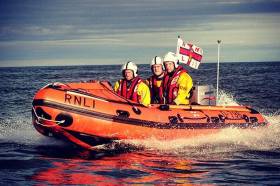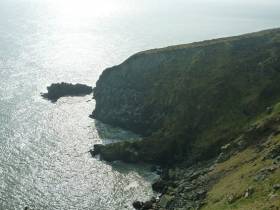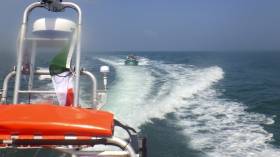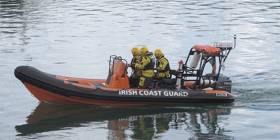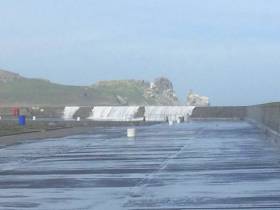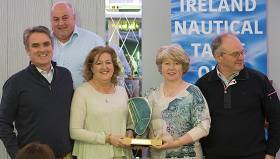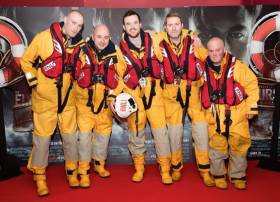Displaying items by tag: Howth
Lifeboat crew, station management, fundraisers and supporters of Howth RNLI were joined by members of the public yesterday (Sunday 2 October) to officially name the North Dublin lifeboat station’s newest lifeboat Aideen Cresswell, in memory of the incredible woman who funded it. The ceremony took place in the sunshine in Howth Harbour where the public saw up-close Howth RNLI’s newest lifeboat as it was officially named by Mrs Cresswell’s nephew Seymour, in the maritime tradition by pouring champagne over its bow.
As Afloat.ie previously reported, Mrs Aideen Cresswell (nee Stokes) whose generous bequest funded the €71,000 lifeboat was born in London in 1921 and later came to live in The Baily, Howth. At a young age she met her husband John Cresswell at an RNLI ball and they spent their honeymoon on board a yacht sailing from Dublin to Dunmore East. Mrs Cresswell’s nephew Seymour remembered his aunt during his speech, whom he described as ‘a rebel; feisty and a free spirit’. He spoke of her lifelong support of the RNLI and her affinity for the sea. She passed away in 2011after a short illness in her ninety-first year and was married to John for sixty-seven years.
RNLI Vice-President and member of the Irish Council Mr. Peter Killen accepted the lifeboat into the care of the RNLI before passing it on to Howth lifeboat station. The ceremony was opened by Howth RNLI Chairman Russell Rafter and the Vote of Thanks was given by Mrs Rose Michael in her role as Chairperson of the Fundraising branch. Rose also presented Mrs Cresswell’s two nephews with framed photographs of the new lifeboat which were signed by the crew.
On accepting the lifeboat into the care of Howth RNLI, Colm Newport, the station’s Lifeboat Operations Manager said: ‘I accept with great pride this lifeboat Aideen Cresswell to Howth Lifeboat Station. Aideen’s legacy provides the lifeboat that will be of service to all who earn their living or derive pleasure from the sea and coastline in our area. Since we received our new lifeboat this summer she has been called out on service nine times.’
Following the ceremony the new lifeboat was launched into Howth Harbour to the accompaniment of a lone piper. Howth lifeboat station was established before 1825 and taken over by the RNLI in 1862. During its tenure Howth’ s volunteer lifeboat crew have been awarded eleven medals for Gallantry: seven silver and four bronze. The station also operates an all-weather Trent class lifeboat.
The inshore lifeboat remains the workhorse of the RNLI as it has for nearly 50 years. The inflatable rescue craft is highly manoeuvrable and specifically suited to surf, shallow water and confined locations – often working close to cliffs, among rocks or even in caves.
The equipment on board the new lifeboat includes a VHF radio, night-vision technology, and first-aid kit including oxygen. It has a maximum speed of 25 knots and can carry three crew members and five survivors.
The Aideen Cresswell’s predecessor was on service at the station from 2006 to 2016. During its time at the station it was launched 260 times, rescued 288 people, saving 19 lives. It spent 167 hours on service.
Chef Clodagh McKenna Serves Fish Supper Treat For Howth Lifeboat Crew
#RNLI - Celebrated chef, food writer and television personality Clodagh McKenna recently visited Howth Lifeboat Station, where she treated the volunteer crew to a delicious seafood supper.
McKenna’s visit marks the countdown to the RNLI’s upcoming foodie fundraiser Fish Supper, for which the charity is encouraging people across Ireland to host a fish-themed dinner between 14–16 October to raise funds to help save lives at sea.
The Clodagh’s Irish Kitchen author served a three-course meal for the lifeboat crew, starting with fresh Dingle crab cakes with Irish heirloom tomatoes and fennel aioli.
The main dish was pan-fried sea bass with hazelnut butter with dill potato dumplings and autumn vegetable salad. For dessert, the crew were treated to McKenna’s signature chocolate Guinness cake.
“It was an absolute pleasure to cook for the Howth volunteer lifeboat crew,” said McKenna. “My grandpop and uncle were both fishermen, so the work of the RNLI is very close to my heart.
“When I was filming my series Fresh From the Sea for RTÉ, I was lucky enough to get to see the work of the RNLI first hand. Please sign up to make a Fish Supper and help the courageous crews save more lives at sea.”
Last year, RNLI volunteer crew members across Ireland and the UK missed nearly 7,000 evening meals with their loved ones to brave cold, angry and often dangerous waters to save lives.
Fish Supper aims to highlight the disrupted dinners RNLI crew experience day-in-day-out, and the commitment shown not only by them but their families, who often have an empty place at the dinner table.
RNLI volunteers give up their time, comfort and often home cooked meals to respond immediately when the pagers go off.
“Our lifeboat crew here in Howth and indeed across Ireland are prepared to drop everything and respond to a call out at a moment’s notice,” said Howth RNLI mechanic Ian Sheridan.
“Our lifesaving work is essential and often challenging and dangerous. As volunteers, we are extremely grateful to people who donate so generously and host fundraising events such as Fish Supper to enable us to do what we do.”
To request your free fundraising pack and receive more information, visit RNLI.org/FishSupper where you’ll also find recipes, party game ideas and place name cards to help the evening go well.
Last year, RNLI lifeboat crews across 45 stations in Ireland had 1,098 lifeboat launches, bringing 1,244 people to safety. Of all recorded launches, 416 were carried out in the hours of darkness.
Howth Rescue Teams Launch To Lone Kayaker
#Rescue - Howth’s coastguard and lifeboat teams launched to the rescue of a lone kayaker off the North Dublin headland yesterday morning (Wednesday 28 September).
After a concerned onlooker called 999 when spotting that the kayaker was on the water with no life jacket, Howth Coast Guard and Howth RNLI’s inshore lifeboat were both tasked to the scene near Ireland’s Eye.
In the meantime the kayaker had proceeded around the back of the island and out of visibility from the caller on land. While the kayaker didn’t appear in difficulty, there were concerns for their safety.
A coastguard mobile unit proceeded to the end of the pier while the lifeboat launched on service to the far side of Ireland’s Eye, where the crew located a female on an open-deck kayak struggling in the water. She was brought back ashore by the lifeboat without incident.
“If she fell in the water, she had no means of staying afloat as she had no life jacket and only had a phone to call for help, there can be very limited if any phone signal once you go on the water,” according to an Irish Coast Guard spokesperson.
“The kayaker hadn’t checked the weather, which was unsuitable for the craft she was in. The lessons learnt are you need to have an emergency plan if going on the water – VHF radio, flares, whistle, weather information.
“Equally if not more important, you need a life jacket, no excuse.”
The rescue came just hours after Larne RNLI launched to assist two kayakers in difficulty off the Co Antrim coast, as previously reported on Afloat.ie.
Howth RNLI to Name New Lifeboat 'Aideen Cresswell' In Memory of Local Donor with Love of the Sea
Members of Howth RNLI lifeboat will gather at the lifeboat station this Sunday (2 October 2016) to name their new inshore lifeboat Aideen Cresswell in memory of the incredible woman who funded it. Aideen Cresswell (nee Stokes) was born in London in 1921 to Irish parents but came to live in The Baily, Howth. At a young age she met her husband John Cresswell at an RNLI ball and they spent their honeymoon on board a yacht sailing from Dublin to Waterford.
Mrs Cresswell passed away in 2011after a short illness but she will be remembered during the naming ceremony and service of dedication for Howth RNLI’s new inshore lifeboat. She will be represented at the ceremony by her two nephews, Andrew O’Hanlon and Seymour Cresswell, who will hand the new lifeboat into the care of the RNLI and officially name the inshore lifeboat Aideen Cresswell after their aunt.

Following the ceremony the new lifeboat will launch in Howth Harbour to the accompaniment of a lone piper. The well-known Dublin lifeboat station was established before 1825 and taken over by the RNLI in 1862. During its tenure Howth’s volunteer lifeboat crew have been awarded eleven medals for Gallantry: seven silver and four bronze. The station also operates an all-weather lifeboat.
The inshore lifeboat remains the workhorse of the RNLI as it has for nearly 50 years. The inflatable rescue craft is highly manoeuvrable and specifically suited to surf, shallow water and confined locations – often working close to cliffs, among rocks or even in caves.
Equipment includes VHF radio, night-vision equipment, and first-aid kit including oxygen. It has a maximum speed of 25 knots and can carry three crew members and five survivors.
Colm Newport, Howth RNLI Lifeboat Operations Manager said: ‘We are grateful to our donor for her generous gift which has funded our new lifeboat and we look forward to welcoming representatives of her family to Howth to share this day with us. Our volunteer lifeboat crew will be proud custodians of this search and rescue vessel for many years to come.’
‘We hope people will come down and join us for the ceremony and see the wonderful legacy Mrs Aideen Cresswell has left the people of Howth.’
Howth Coast Guard Rescues Man After Cliff Path Fall
#Howth - The Irish Coast Guard cliff rescue team at Howth sprang into action yesterday afternoon (Saturday 16 July) after reports that a man in his 30s had fallen from the cliff path on Howth Head in North Co Dublin.
Working with paramedics from the Dublin Fire Brigade, the coastguard team evacuated the casualty to a waiting ambulance from the spot where he had fallen, some four metres from the cliff path near Drumleck Point.
The casualty had suffered a head injury but was conscious and breathing. He is currently being treated at Beaumont Hospital.
Howth RNLI and the Irish Coast Guard's Waterford-based helicopter Rescue 117 were also tasked to the incident but stood down.
Skerries Lifeboat Tows Motorboat To Safety Off Malahide
#RNLI - Skerries RNLI responded yesterday afternoon (Saturday 28 May) to reports of a motorboat adrift with engine difficulties some four miles east of Malahide Estuary.
Skerries RNLI volunteers launched the lifeboat shortly before 2pm when Dublin Coast Guard tasked them to assist the boat, with four men on board, that was experiencing engine trouble.
Those on board the casualty vessel was able to provide the coastguard with GPS co-ordinates for their position.
As a result the lifeboat, with volunteer Joe May at the helm and crewed by Steven Johnson and Laura Boylan, were able to proceed directly to the vessel.
The motorboat was then taken under tow by the lifeboat and returned safely to Howth. Conditions at the time were clam with a slight sea fog.
Speaking after the callout, Skerries RNLI lifeboat operations manager Gerry Canning said: "Everyone on board was wearing a lifejacket and they were able to give us their exact location. Even the most prepared can encounter difficulties at sea.
"We would just like remind people that if they are in difficulty or see others who may be in difficulty to dial 999 and ask for the coastguard."
Skerries RNLI is currently on the lookout for new volunteers to join its 18-strong crew, as previously reported on Afloat.ie.
This afternoon the Irish Coast Guard were alerted to concerns for a diver who was at the slip at Howth Harbour, Co Dublin.
The local Coast Guard unit in Howth were tasked and were quickly on scene.
On arrival the team were met with a male diver in his 40s who had experienced a rapid ascent while returning to the surface from 15 meters depth. With the possibility of decompression sickness the Coast Guard team provided medical assistance until the arrival of an ambulance.
The casualty was taken to Beaumont Hospital where his condition is stable.
Howth Coast Guard Warns Walkers Over Waves On East Pier
#WaterSafety - Howth Coast Guard has advised walkers to avoid the harbour's East Pier today (Sunday 10 April) due to the danger of breaking waves.
It comes as Met Éireann issues a Status Yellow weather warning for most of the country over strong winds, heavy rainfall and high spring tides with the moon at perigee.
Cork is the worst hit by the current deluge with many parts of the city hit by flooding this morning, as The Irish Times reports.
Gale warnings and small craft warnings are currently in effect around the coast, as easterly gales are expected to surpass Force 6 from Erris Head to Fair Head to Wicklow Head.
Coast Guard unit at scene. More reports coming in of other coastal areas being exposed to waves breaking endangering the...
Posted by Howth Coast Guard on Sunday, 10 April 2016
Malahide Yacht Club Wins All Ireland Nautical Table Quiz in aid of the RNLI
The first All Ireland Nautical Table Quiz in aid of the RNLI took place last Friday evening in the Marine Hotel, Sutton in County Dublin.
There was a great turn out, including a team from the Howth RNLI crew. The winning team was Malahide Yacht Club. They received first prize and the All Ireland Nautical Table Quiz Perpetual Trophy.
Presenting the prizes to the winners, John Craddock, Commodore of Howth Sailing and Boating Club, thanked the very generous sponsors and the voluntary contribution of club members for making it all happen. Plans are already underway for next years Quiz which will be bigger and better.
The event raised close to €2,000
RNLI Volunteers Walk The Red Carpet At Gala Screening Of 'The Finest Hours'
#RNLI - Volunteer lifeboat crew from three RNLI stations in Dublin were in Dundrum on Wednesday evening (17 February) for the Irish gala screening of Disney's latest action film The Finest Hours.
Volunteers Gerry Canning and Eoin Kelly from Skerries RNLI, Manus O’Donnell from Howth RNLI and Paul Cummins and Jack Shanahan from Dun Laoghaire RNLI were invited to swap lifeboats for the limelight as they shared the red carpet with guests at the high-action movie premiere at Dundrum Town Centre.
The film tells the incredible true story of the heroic 1952 SS Pendleton rescue mission carried out by the US Coast Guard which is still regarded as one of the greatest sea rescues of all time.
The Finest Hours is based on the acclaimed non-fiction book of the same name by Michael J Tougias and Casey Sherman, which tells the tale of true events that took place 64 years ago this week.
Presented in Digital 3D and IMAX 3D, the film will transport audiences to the heart of the action, creating a fully-immersive cinematic experience on an epic scale.
Owing to the long and close relationship that the RNLI holds with the US Coast Guard, it was highly appropriate for Disney and the RNLI to work together in Ireland, while helping to raise awareness of the charity’s lifesaving work.
The Dublin crew, dressed in full all-weather lifeboat kit, ushered guests to their cinema seats where ahead of the movie, they watched a hard-hitting advertisement from the RNLI’s national drowning prevention campaign, Respect the Water.
The campaign which was first launched last summer warns people that coastlines and waters can be dangerously unpredictable.
The 60 second commercial entitled ‘Breathe’ is shown from the point of view of the casualty, played by an actor. The narrator Andy Serkis invites the audience to hold its breath while watching the film, as the casualty struggles and succumbs to the effects of cold water shock in the time the audience is holding their breath.
The film reveals that, on land, the average person can hold their breath for 45 seconds – but in cold water, they might not last 10.
Speaking following the gala screening, Gerry Canning from Skerries RNLI said: "It was great to see such strong parallels between the bravery, selflessness and community spirit shown by the characters in the film which is mirrored by RNLI lifeboat crew all around Ireland.
"It’s not unusual for us to be woken up by our pagers on a normal week night, so an evening of glitz and glamour was a nice change."
In 2015, RNLI lifeboat crews – who are on-call 24/7, 365 days a year – launched 1,098 times rescuing 1,244 people.
The RNLI has been operating since 1824 and has continually shared expertise, advice and training knowledge with the US Coast Guard for over 100 years.
RNLI volunteers also attended gala screenings of the film in Galway, Cork and Limerick last night.
The Finest Hours will open in Irish cinema today (Friday 19 February). Watch the trailer below.



























